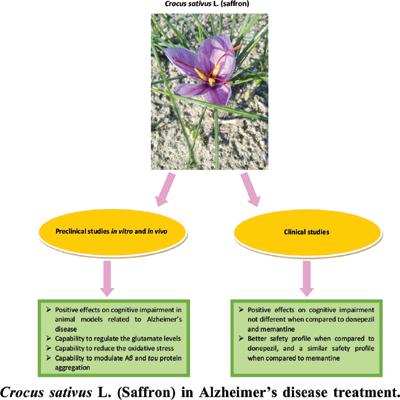Current Neuropharmacology ( IF 4.8 ) Pub Date : 2021-08-31 , DOI: 10.2174/1570159x19666210113144703 Grazia D'Onofrio 1 , Seyed Mohammad Nabavi 2 , Daniele Sancarlo 3 , Antonio Greco 3 , Stefano Pieretti 4

|
Crocus sativus L. (saffron) appears to own neuroprotective effects on cognitive impairment in patients with Alzheimer’s disease (AD). The purpose of this work is to review evidence and mechanisms of saffron-induced therapeutic outcomes and measureable cognitive benefits in AD.
The literature was reviewed, and preclinical and clinical studies were identified. In vitro and in vivo preclinical studies were selected according to these criteria: 1) development of saffron pharmacological profile on biological or biophysical endpoints; 2) evaluation of saffron efficacy using animal screens as an AD model, and 3) duration of the studies of at least 3 months. As for the clinical studies, the selection criteria included: 1) patients aged ≥ 60, 2) AD diagnosis according to National Institute on Aging-Alzheimer's Association (NIAAA) criteria, and 3) appropriate procedures to assess cognitive, functional, and clinical status. A total of 1477 studies published until November 2020 were identified during an initial phase, of which 24 met the inclusion criteria and were selected for this review.
Seventeen in vitro and in vivo preclinical studies have described the efficacy of saffron on cognitive impairment in animal models of AD, highlighting that crocin appears to be able to regulate glutamate levels, reduce oxidative stress, and modulate Aβ and tau protein aggregation. Only four clinical studies have indicated that the effects of saffron on cognitive impairment were not different from those produced by donepezil and memantine and that it had a better safety profile.
Saffron and its compounds should be further investigated in order to consider them a safer alternative in AD treatment.
中文翻译:

Crocus Sativus L.(藏红花)治疗阿尔茨海默病:对认知障碍的生物活性作用
Crocus sativus L.(藏红花)似乎对阿尔茨海默病 (AD) 患者的认知障碍具有神经保护作用。这项工作的目的是审查藏红花诱导的 AD 治疗结果和可测量的认知益处的证据和机制。
对文献进行了回顾,并确定了临床前和临床研究。根据以下标准选择体外和体内临床前研究:1)开发藏红花在生物学或生物物理终点上的药理学特征;2) 使用动物筛选作为 AD 模型评估藏红花功效,以及 3) 研究持续时间至少 3 个月。至于临床研究,选择标准包括:1) 年龄 ≥ 60 岁的患者,2) 根据美国国家老年痴呆症协会 (NIAAA) 标准进行的 AD 诊断,以及 3) 评估认知、功能和临床状态的适当程序. 在初始阶段共确定了截至 2020 年 11 月发表的 1477 项研究,其中 24 项符合纳入标准并入选本次审查。
17 项体外和体内临床前研究描述了藏红花对 AD 动物模型认知障碍的疗效,强调藏红花似乎能够调节谷氨酸水平、减少氧化应激并调节 Aβ 和 tau 蛋白聚集。只有四项临床研究表明,藏红花对认知障碍的影响与多奈哌齐和美金刚产生的影响没有区别,并且具有更好的安全性。
应进一步研究藏红花及其化合物,以便将它们视为 AD 治疗中更安全的替代品。











































 京公网安备 11010802027423号
京公网安备 11010802027423号